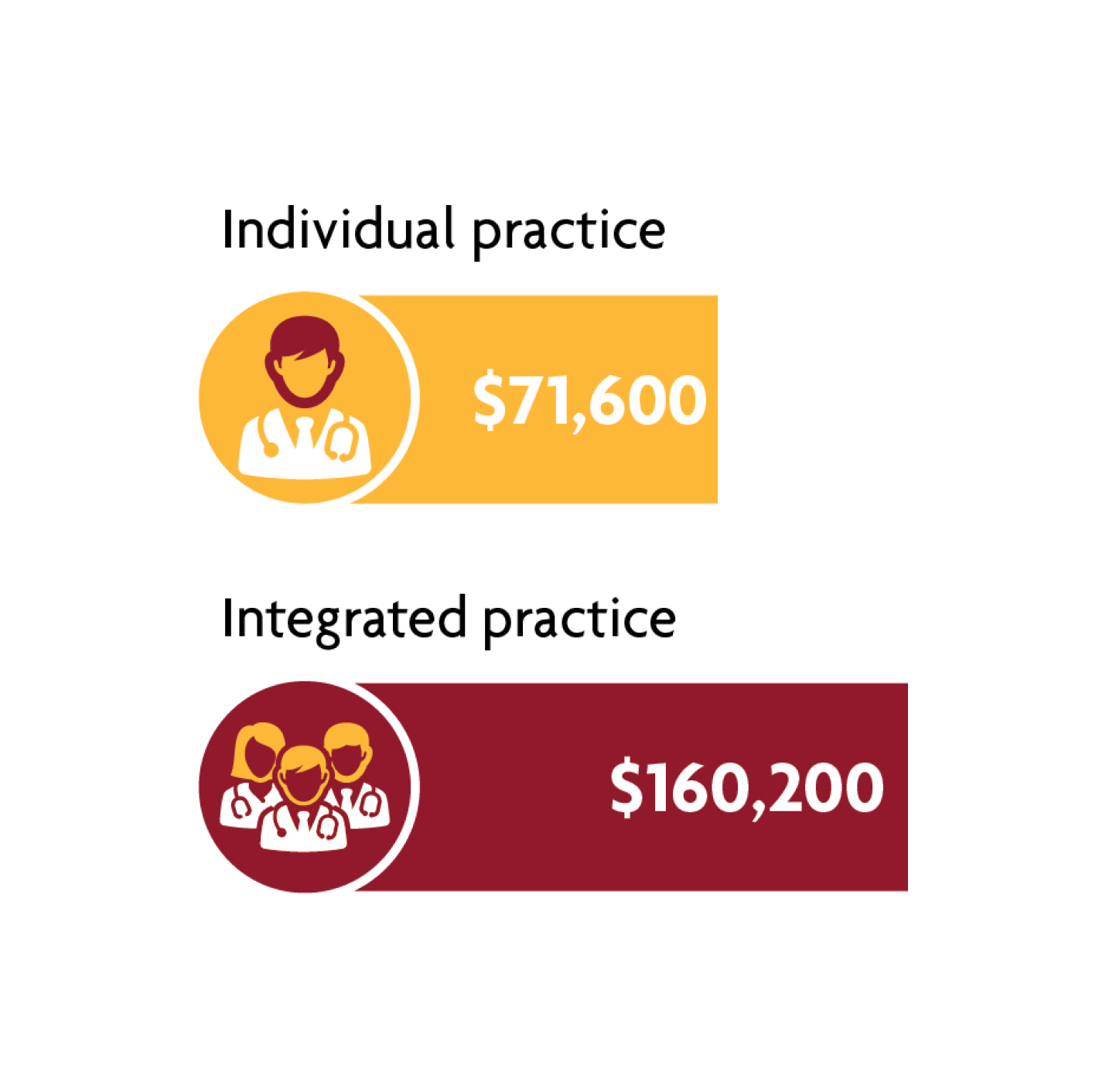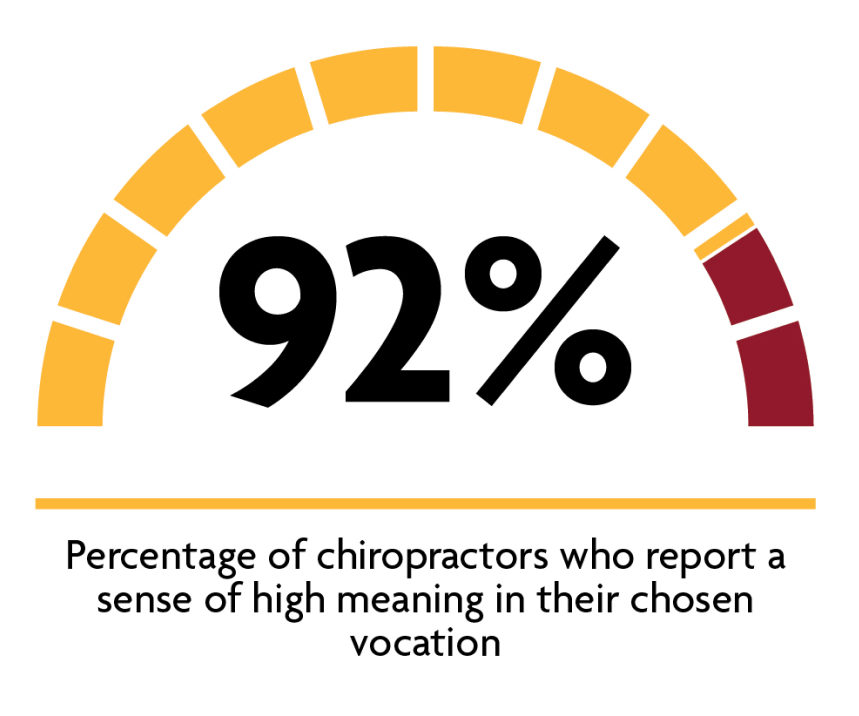About This Page
This page is designed to help give an overview of the chiropractic industry to those considering pursuing a Doctor of Chiropractic (DC) degree. The admissions team here at National University of Health Sciences knows that aspiring chiropractic physicians have a lot to think and learn about before they decide if, when, and where to pursue their degree. We hope this informational guide will bring you real insight into exploring an exciting career as a chiropractic physician.
Introduction to the Field
What does a chiropractic physician actually do?
A chiropractic physician or a Doctor of Chiropractic (DC) specializes in natural, non-invasive health care, and is trained to diagnose, treat, and manage a full range of patient conditions. DCs consider the various factors that affect human health, including: biomechanical dysfunction, trauma, hygiene, stress, emotion, nutrition, exercise, posture, etc.
A DC performs adjustments or physical manipulation to the spine and other joints, but might also perform acupuncture, lifestyle and nutritional interventions, rehabilitation therapy, and diagnostic tests like X-ray, ultrasound, and blood pressure.
What are chiropractic physicians able to do?
Chiropractic physicians are able to:
- Treat patients effectively with a wide variety of healing skills
- Practice as a primary-care (first contact) physician in most states
- Run their own business or work as an associate in a group or integrative practice
- Specialize in fields such as sports medicine, acupuncture, pediatrics, women’s health, neurology, etc.
- Become licensed in all 50 states. Those seeking licensure as a DC must take national board examinations, as well as apply for licensure in the state where they plan to practice. The professional organizations representing chiropractic physicians include the American Chiropractic Association (ACA) and the World Federation of Chiropractic (WFC).

Career Outlook And Industry Statistics
If you are considering a career in chiropractic medicine, there has never been a better time to invest in an advanced degree in this field. The Bureau of Labor Statistics (BLS) also notes the expected growth toward chiropractic medicine.

If you are considering a career in chiropractic medicine, there has never been a better time to invest in an advanced degree in this field. The Bureau of Labor Statistics (BLS) also notes the expected growth toward chiropractic medicine. “Employment of chiropractors is projected to grow 7 percent from 2018 to 2028, much faster than the average for all occupations. People across all age groups are becoming increasingly interested in alternative or complementary health care. Chiropractic care is appealing to patients because chiropractors use nonsurgical methods of treatment and do not prescribe drugs.”
Source: Bureau of Labor Statistics (bls.org)

At National University, we believe in bringing together professionals from a broad range of medical specialties for the benefit of patients and the healthcare industry as a whole. This makes our graduates ideally suited for the growing number of integrative practice opportunities. Compensation for working in an integrated setting is also more rewarding, according to the Chiropractic Economics 22nd Annual Salary and Expense survey in 2020.The average annual salary for DCs in a solo practice is $71,600. However, DCs working in an integrated setting earned an average annual salary of $160,200.
Source: 22nd Annual Salary and Expense Survey 2020, Chiropractic Economics Magazine.

Studies show the importance of a healthy work-life balance for all, but particularly those in health care professions. A balanced work-life approach has been found to be beneficial not just in terms of overall job satisfaction, but also for achieving the main reason many chiropractic physicians choose the profession in the first place: the fulfillment of helping patients. According to one survey, 92 percent of chiropractors report a sense of high meaning, and 70 percent a high level of job satisfaction.
In a 2018 Chiro Economics survey, the average chiropractor reported seeing patients 34 hours a week reported, and working (up to) 40 hours per week. Contrastingly an American Medical Association study found that most allopathic physicians devote between 40 and 60 hours each week to work, and 25 percent work between 61 and 80 hours per week. What does this mean? Chiropractic physicians have more opportunity to structure their professional time, affording greater opportunity to achieve work-life balance and achieve sustainable career satisfaction.
Source: https://www.payscale.com/data-packages/most-and-lease-meaningful-job/full-list
DC Graduates have a variety of different options after completing a degree, such as:
- Private practice – general or specialized practice
- Group practice or integrative clinic
- Hospital or wellness institution
- University researcher, faculty, or administrator

5 Questions to Ask Before Selecting Your DC Program
There are actually important differences in philosophy among chiropractic schools. Some focus more exclusively on adjusting as the primary treatment for all patient conditions, adhering to a traditional “chiropractic philosophy” of health that originated at the turn of the century. Other schools, like National University of Health Sciences, use modern medical science, evidence-based treatments, medical diagnostics and laboratory tests, and never hesitate to refer or co-manage a case with an MD or other health care practitioners, when required. Selecting a school to pursue your Doctor of Chiropractic degree can be challenging. You should start by asking important questions like the ones listed below:
Hidden Toggle
Which school will best prepare you for the future of healthcare?
Integration: With a growing trend toward multidisciplinary and integrated practice settings, it is important to look for a school that prepares you for that future. This means a program where DCs train to work in cooperation with other health professionals, such as MDs, DOs, NDs, etc.
Primary Care: Look for a school that prepares you as a primary care physician. Most states define a chiropractor as a primary care physician, meaning you are able to serve as a patient’s first contact in the health care system, can diagnose and manage the full range of patient conditions, and refer and co-manage cases with physicians in other medical specialties.
What we offer: National University prepares graduates for the future of health care by offering a campus dedicated to integrative medicine. You’ll study and work side-by-side with students and faculty from its naturopathic medicine, oriental medicine, and acupuncture programs. This experience prepares you to understand and speak with a wider range of medical professionals when you graduate. In turn, you’ll be able to establish strong referral networks with other physicians, and gain respect in the medical community. Most of all, you’ll be able to provide better advice and care for your future patients.
Which school offers the most beneficial opportunities for clinical training?
Geography: Consider a school located in a thriving health care job market, which results in greater employment opportunities after graduation. Look for hospitals, veterans’ clinics, libraries, science and health industries nearby, as well as convenient transportation (airports, trains, buses).
Clinic Opportunities: Consider the clinical phase of the program. You should spend a full year treating actual patients under the supervision of clinical faculty, learning how to keep and read medical records, and gain the confidence and skills to succeed when you start your own practice.
What we offer: National University offers DC programs in either suburban Chicago or the Tampa Bay area of Florida. You have a broad range of options as an intern from our university clinics, to rotations in hospitals, veteran’s facilities, or community health clinics.
Which school provides the most comprehensive medical school education?
Basic Sciences: Review the basic science curriculum. As with any good medical education, the program should include a strong emphasis in basic sciences, with rigorous coursework in anatomy, biochemistry, pathology, and more.
Clinical Sciences: Review the clinical science coursework and practical training in the program. This part of a DC degree teaches students important skills in diagnosing patient conditions, performing physical exams and utilizing chiropractic techniques, physical rehabilitation, and diagnostic imaging. Students learn through practical training how to build successful doctor-patient relationships.
What we offer: At National University, your basic science coursework will be similar to that of a typical MD student, including one year of hands-on human cadaver dissection in our gross anatomy laboratory. Our clinical sciences will have you practicing examination skills in your first six months, with a heavy emphasis on thorough diagnostic skills.
Which school delivers the most in-depth chiropractic adjustment/ technique instruction?
Evidence-Based: Understand the technique instruction, to be sure that the chiropractic adjustments taught are backed by research proving their effectiveness. Look for a school that offers evidence-based instruction and technique.
Hands-On: Understand how chiropractic techniques are taught. Some chiropractic schools have you simply watch an instructor adjust for a long period of time, teaching you only how to “set-up” your hands for the technique. You might not actually get to perform an adjustment on your own until far into your training. Instead, look for a school that allows you to practice complete hands-on adjustments in class, under supervision, in your first year of school.
What we offer: DC students at National University learn over 100 scientifically proven adjustments, and master them with hours of hands-on practice. At NUHS, you’ll start practicing adjustments under expert supervision within six months of starting your program.
Which school supports your success?
Tutoring and Academic Support: Check if the professors teach classes directly or use assistants. Ask if the school offers free peer tutoring (where senior students provide help in specific topics).
Business Classes: Discover what business classes are included in the curriculum. When you graduate, you’ll most likely be starting your own business, and you’ll also need to understand insurance, billing, marketing, and business management procedures. Be sure the school you pick offers classes that give you these skills.
Additional Education: Consider what extra courses are available to students on the weekend or online that could augment your primary degree. Is continuing education reserved primarily for practicing physicians, or is it also available to DC students? Does the institution offer an opportunity to enroll in dual-degrees or multiple programs so that you can earn more credentials with less time and money?
Strong Alumni Network: Look for a school where alumni are involved, communicate with each other and current students, and where you can reach out to them for mentoring and career support.
What we offer: In addition to opportunities to earn multiple degrees on one campus, National University offers an array of student support services that contribute to a successful educational experience. These include academic advising, peer tutoring, flexible tracks, various student clubs, and more. Business classes designed to help you build, market, and manage your practice are included in the curriculum, often with industry experts as guest speakers. NUHS has an excellent postgraduate department where students are welcome and encouraged to take additional courses that provide specialty skills for future practice. Finally, National University has an engaged alumni network that make themselves available to provide current support, mentoring, shadowing experiences, etc.
Navigating The Admissions Process
Another very important element that comes with deciding to go to chiropractic school is knowing how to navigate your way through the admissions process. You need to be sure you understand the requirements for acceptance, what documents you will need, deadlines for application elements, and ways to make yourself an attractive prospect. You should start by asking important questions like the ones listed below:
What undergraduate degree is required?
A science major such as biology or chemistry is the best preparation, since chiropractic schools require you to have completed a certain amount of science credits, including laboratory sciences.
Many undergraduate schools have “pre-health profession” or “pre- chiropractic” tracks. Don’t worry, even if you don’t have a science major, you can complete necessary science prerequisites prior to admission.
What will make me a more competitive applicant?
You can demonstrate this by having a “shadow experience” – spending time in a chiropractor’s office in order to understand if this is the right career for you.
It is also important to select undergraduate classes that will make you more prepared when you begin your advanced degree. Review our suggested course outlines to understand the courses you should be taking at your undergraduate institution that will satisfy our prerequisite requirements.
What do most chiropractic schools require?
Even if you think you don’t have everything needed to apply to a chiropractic school, call an admissions counselor to consider your options. They may be able to help!
Most chiropractic schools will require the following documents:
- Application for admission
- Application fee and deposit
- Essay question responses
- Character references
- Undergraduate transcripts
NOTE: Most chiropractic schools will not require the following:
- Standardized tests (e.g. MCAT, GRE)
- On-campus interview
Download the Guide Today!
If you’re passionate about pursuing a future in chiropractic medicine we invite you to download our resource—A Career Guide to Becoming a Doctor of Chiropractic.
National University of Health Sciences Chiropractic Program
National University prepares students to become first-contact, primary care physicians fully qualified to diagnose, treat, and manage a wide range of conditions. We believe a superior education starts with an evidence-based, broad-scope curriculum emphasizing integrative medicine.
Our Academic Superiority
National University’s chiropractic program is rigorous, uncompromising, and built on a solid foundation in the basic sciences. We maintain the highest admission standards for our students. For example, NUHS is the only accredited chiropractic degree program to require a bachelor’s degree for admission. As a result, NUHS graduates often become leaders in their professions, and credit National University as the reason for their confidence and success.

Our Dedication to Integrative Medicine
National University prepares graduates for the future of health care by offering a campus dedicated to integrative medicine. In fact, you’ll study and work side-by-side with students and faculty from its naturopathic medicine, oriental medicine, and acupuncture programs. As a result, you will be better prepared to work and thrive in today’s integrated health care market.
Our History of Leadership
Founded in 1906, National University has over 110 years of experience in graduating leaders in the chiropractic profession. A driving force for moving natural health care into mainstream medicine, we were the first to offer hospital experience to chiropractic students, push for national accreditation of chiropractic colleges, and publish medically-indexed and peer-reviewed scientific journals.
Next Steps
The team at National University hopes that this guide was helpful in providing you information about the chiropractic industry and how to successfully begin your journey towards a Doctor of Chiropractic Medicine degree.
Please do not hesitate to reach out to us if you have any questions about our programs or the NUHS student experience. You can give us a call at the Office of Admissions 1-800-826-6285 or email us at [email protected].

Learn More About Our Chiropractic Program from our Students
Denise Shostek
“I love this program. National has embraced me as an older student. I just feel so welcome and warm here. It’s been a great experience. I love the studies. I love the curriculum. It’s hard; it’s challenging; and, in a year and a half, I will be a doctor. I thought that it would be scaled back from medical school. In reality, my friends in medical school are using the exact same textbooks that we use.”
Caleb Suciu
“I never knew how much of a primary care physician I would become here. I’ll be able to diagnose any patient that comes in the door, and talk with any other type of doctor out there. I’m very lucky I landed here.”
Featured Chiropractic Blog Posts
We invite you to check out a few of our most recent chiropractic blog posts to help you stay in-the-know on all things chiropractic medicine.
NUHS celebrates Spring 2024 graduates
Amidst plenty of cheers and applause, National University of Health Sciences celebrated the hard work and accomplishments of its Spring 2024 graduates at the April 19 commencement ceremony. Graduates received diplomas in chiropractic, naturopathic medicine, advanced clinical practice, acupuncture and biomedical sciences.
My FINAL Finals
With finals approaching as I write this, I am officially finishing up my last classes at National. This is a surreal feeling…
Clap It Up!
Another semester in the books. When the trimester begins…



